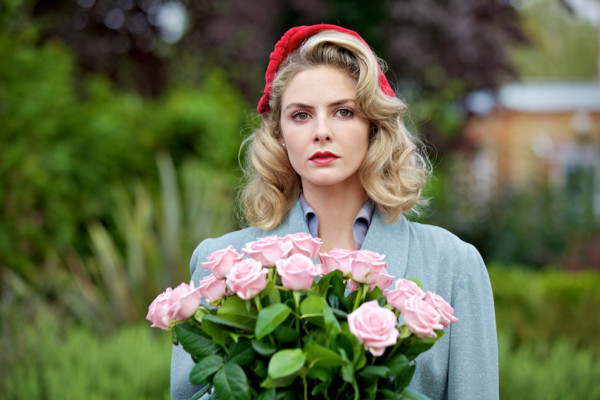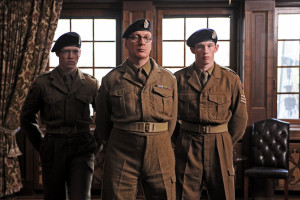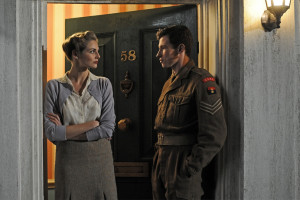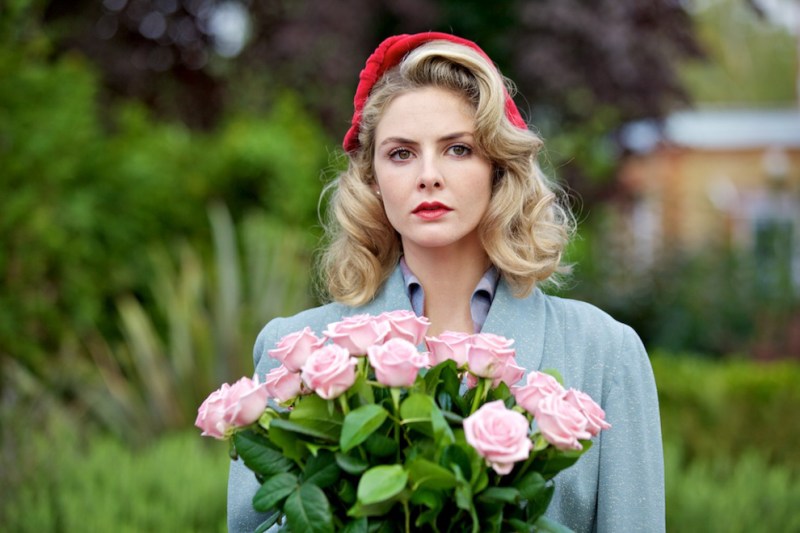
The men of “Queen and Country” never make it to the frontlines of battle. Instead, they’re waist-deep in the small skirmishes of army base politicking and their own love lives.
The film follows the trials and tribulations of 18-year-old Bill Rohan (Callum Turner), a sergeant in the English army during the Korean War. Director John Boorman introduced a very young Rohan in his 1987 film “Hope and Glory,” which was nominated for five Academy Awards; in “Queen and Country,” Boorman finds his protagonist nine years older and none the wiser.
Rohan’s may be a classic case of guilt by association. As friendships go, Rohan’s are limited and eccentric. His partner-in-crime is Percy Hapgood (Caleb Landry Jones), a red-headed sergeant with a penchant for pranks and emotional outbursts. At a concert, Rohan falls for a mysterious, unnamed woman in the seat in front of him, Ophelia (his own name for her), who sets him up and breaks him down in the weakest of the film’s multiple subplots.
Rohan’s frequent conflicts with his superiors are likewise peculiar. His back-and-forth with Sergeant Major Bradley (David Thewlis) harkens back to Joseph Heller’s “Catch-22.” After all, what’s an army story without a laughably inflexible superior officer? Bradley brings Rohan and Hapgood before Major Cross (Richard Grant) in turn, each time citing some petty violation — the top button of a uniform jacket undone, “dumb insolence” (Cross: “That hasn’t been invoked since the first World War!”).

There’s a constant tension between Rohan’s fraught friendships and his tenuous relationship with top brass. Hapgood’s antics are usually harmless, but the petty takes a turn for the more serious when a new recruit refuses to go to the front lines, citing Rohan’s antiwar sentiments as his reason. In an attempt to ward off a public relations gaffe, Cross suspends Rohan from duty. Hapgood decides to steal the company clock in response. The missing timepiece turns the base on its head and reshuffles the official structure. Boorman’s manipulation of this otherwise overused dynamic — friends versus enemies — is refreshing and masterful.
“Queen and Country” is also funny — surprisingly so, at times. But the film’s moments of levity are never without their more sober counterparts. Boorman allows his audience their satisfaction when Sergeant Major Bradley is caught reprimanding Rohan in the presence of a private — a punishable offense. In a moment of incredible irony, Bradley is brought before Cross, found guilty and discharged for psychological evaluation. It seems as though the villain is finally getting his just deserts. But a remorseful Rohan discovers, later, that Bradley was still suffering from the trauma of his Normandy landing during World War II; his obsessive compliance with army law kept his crumbling psyche intact. The audience shares in the sucker punch of Rohan’s realization. After the revelation of Bradley’s illness, his previous actions are understandable, saddening and far from funny.
Boorman is most successful in his exploration of on-base relationships. Off-base, in town, “Queen and Country” is hit-or-miss. Ophelia (Tamsin Egerton), Rohan’s love interest, communicates in clichés. “I’m going to marry a sweet, dull man who will never overexcite me,” she says, teary-eyed, when Rohan visits her. She insists upon calling him “William,” wishes she were “a free spirit, spontaneous.” She’s an Oxford student, a beautiful intellectual with a murky (but possibly royal) lineage and an unspeakably sad back story — yawn. She dumps him without ceremony and the film moves forward without a hitch.

In the end, Ophelia seems inconsequential to the men and extraneous to the reality of the Korean War. Though there are no bloody scenes from the front lines, Boorman ensures the specter of battle is a constant presence — even as Rohan and Hapgood grapple with their latest tiff with Bradley, new recruits beg to be left off rosters for the next deployment to Korea. In a brilliant, surreal sequence, Rohan dreams that Korean troops are moving silently between the cots of sleeping British recruits on base. For a moment, the battlefield encroaches on the homefront. Ophelia’s tryst with Rohan is a strange, unnecessary diversion in comparison.
Even if “Queen and Country” falters in its depiction of love during wartime, it paints a sophisticated portrait of friendships and interpersonal conflicts within ranks—a microcosm of the war raging half a world away.
“Queen and Country” opens this Friday, Feb. 27, at Landmark’s Opera Plaza Cinemas in San Francisco (Director John Boorman will be available for a Q & A at the 7 p.m. screening), Landmark’s Shattuck Cinemas in Berkeley and Rialto Cinemas in Sebastopol. Opens March 6, 2015, at Camera Cinemas in San Jose.
Contact Madelyne Xiao at madelyne ‘at’ stanford.edu.
